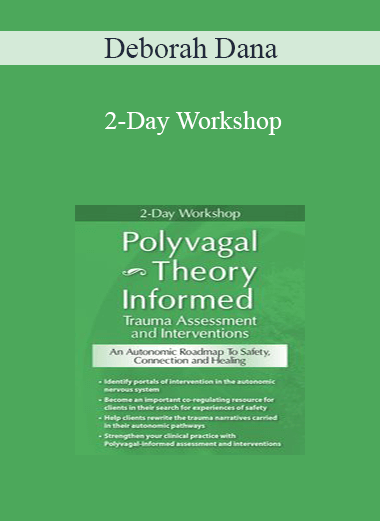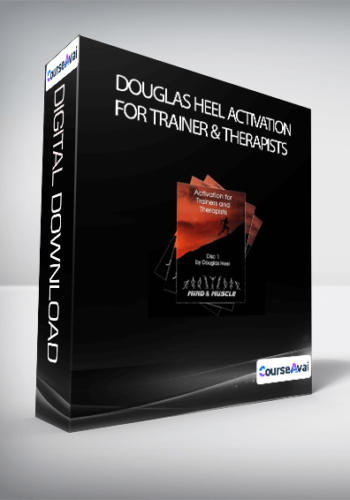Deborah Dana – 2-Day Workshop: Polyvagal Theory Informed Trauma Assessment and Interventions: An Autonomic Roadmap to Safety, Connection and Healing
Original price was: $439.99.$74.70Current price is: $74.70.
Delivery Method: Deliver digital download link to your email after successful payment
Traumatic events have a far-reaching impact on this system. Autonomic pathways trigger survival responses that often lead our clients on a painful journey into a state of shutdown.
Description
Unlock your potential with the Unlock your potential with the Deborah Dana – 2-Day Workshop: Polyvagal Theory Informed Trauma Assessment and Interventions: An Autonomic Roadmap to Safety, Connection and HealingDeborah Dana – 2-Day Workshop: Polyvagal Theory Informed Trauma Assessment and Interventions: An Autonomic Roadmap to Safety, Connection and Healing course for only course for only Original price was: $439.99.Original price was: $439.99.$$74.7074.70Current price is: $74.70.Current price is: $74.70. at at Giolib.comGiolib.com! Explore our comprehensive library of over 60,000 downloadable digital courses across various ! Explore our comprehensive library of over 60,000 downloadable digital courses across various Medical & HealthMedical & Health. Get expert-led, self-paced learning at up to 80% savings. Elevate your skills today!. Get expert-led, self-paced learning at up to 80% savings. Elevate your skills today!
-
Deborah Dana – 2-Day Workshop: Polyvagal Theory Informed Trauma Assessment and Interventions: An Autonomic Roadmap to Safety, Connection and Healing

- Faculty:Faculty:
- Deborah DanaDeborah Dana
- Duration:Duration:
- 2 Full Days2 Full Days
- Format:Format:
- Audio and VideoAudio and Video
- Copyright:Copyright:
- May 21, 2019May 21, 2019
Description
Handouts
| Manual – Polyvagal Theory Informed Trauma Assessment and Interventions (16 MB)Manual – Polyvagal Theory Informed Trauma Assessment and Interventions (16 MB) | 88 Pages88 Pages | Available after PurchaseAvailable after Purchase |
Outline
ESSENTIALS OF POLYVAGAL THEORY ESSENTIALS OF POLYVAGAL THEORY
- Evolution of the autonomic nervous systemEvolution of the autonomic nervous system
- How trauma influences autonomic profilesHow trauma influences autonomic profiles
- Three organizing principles
Three organizing principles
- Neuroception: Detection without perceptionNeuroception: Detection without perception
- Hierarchy: 3 predictable pathways of responseHierarchy: 3 predictable pathways of response
- Coregulation: The biological imperativeCoregulation: The biological imperative
NEUROCEPTION AND THE SHAPING OF AUTONOMIC PATHWAYSNEUROCEPTION AND THE SHAPING OF AUTONOMIC PATHWAYS
- Understand the internal surveillance systemUnderstand the internal surveillance system
- Track cues of safety and dangerTrack cues of safety and danger
- Everyday “biological rudeness”Everyday “biological rudeness”
- Trauma, autonomic wisdom, and cognitive overrideTrauma, autonomic wisdom, and cognitive override
NAVIGATE THE AUTONOMIC HIERARCHY NAVIGATE THE AUTONOMIC HIERARCHY
- Exploring three autonomic circuits
Exploring three autonomic circuits
- Sympathetic branchSympathetic branch
- Ventral vagal pathwayVentral vagal pathway
- Dorsal vagal pathwayDorsal vagal pathway
- How trauma shapes cycles of autonomic responseHow trauma shapes cycles of autonomic response
- Engage the regulating capacities of the autonomic nervous systemEngage the regulating capacities of the autonomic nervous system
- Introduction to autonomic mappingIntroduction to autonomic mapping
THE SOCIAL ENGAGEMENT SYSTEM THE SOCIAL ENGAGEMENT SYSTEM
- The five elements of the Social Engagement SystemThe five elements of the Social Engagement System
- What happens when parts of the system are unavailable?What happens when parts of the system are unavailable?
- Using the Social Engagement System to regulate statesUsing the Social Engagement System to regulate states
- Exercising the Social Engagement SystemExercising the Social Engagement System
TRACKING AUTONOMIC STATES TRACKING AUTONOMIC STATES
- Seeing patterns over timeSeeing patterns over time
- Use micro-moments to resource changeUse micro-moments to resource change
- Explore the blended states of play and stillnessExplore the blended states of play and stillness
- Create autonomic anchorsCreate autonomic anchors
MEETING THE BIOLOGICAL NEED FOR CONNECTION MEETING THE BIOLOGICAL NEED FOR CONNECTION
- Mapping the continuum of solitude to socialityMapping the continuum of solitude to sociality
- Create safety in co-regulationCreate safety in co-regulation
- Working with the cycle of reciprocity – rupture – repairWorking with the cycle of reciprocity – rupture – repair
SHAPING THE AUTONOMIC NERVOUS SYSTEM TOWARD SAFETY SHAPING THE AUTONOMIC NERVOUS SYSTEM TOWARD SAFETY
- Identify portals of interventionIdentify portals of intervention
- Create neural exercisesCreate neural exercises
- Use breath as a regulatorUse breath as a regulator
- Resourcing new patterns through movementResourcing new patterns through movement
- Explore the autonomic response to touchExplore the autonomic response to touch
- Use autonomic imageryUse autonomic imagery
INCORPORATING POLYVAGAL THEORY IN CLINICAL PRACTICEINCORPORATING POLYVAGAL THEORY IN CLINICAL PRACTICE
- Getting comfortable teaching Polyvagal Theory to clientsGetting comfortable teaching Polyvagal Theory to clients
- Tracking the 8 steps of a Polyvagal-Informed clinical sessionTracking the 8 steps of a Polyvagal-Informed clinical session
- Polyvagal-Informed assessment and treatment planningPolyvagal-Informed assessment and treatment planning
- Polyvagal Theory and Phase I trauma treatmentPolyvagal Theory and Phase I trauma treatment
RESPONSIBILITIES OF A POLYVAGALINFORMED THERAPIST RESPONSIBILITIES OF A POLYVAGALINFORMED THERAPIST
- The guiding questionsThe guiding questions
- Ethical considerationsEthical considerations
- Research limitations and potential risksResearch limitations and potential risks
Faculty

Deborah Dana, LCSW Related seminars and products: 10
Deb Dana, LCSWDeb Dana, LCSW is a clinician and consultant specializing in working with complex trauma. She is a consultant to the Traumatic Stress Research Consortium in the Kinsey Institute and clinical advisor to Khiron Clinics. She developed the Rhythm of Regulation Clinical Training Series and lectures internationally on ways Polyvagal Theory informs work with trauma survivors. Deb is the author of is a clinician and consultant specializing in working with complex trauma. She is a consultant to the Traumatic Stress Research Consortium in the Kinsey Institute and clinical advisor to Khiron Clinics. She developed the Rhythm of Regulation Clinical Training Series and lectures internationally on ways Polyvagal Theory informs work with trauma survivors. Deb is the author of The Polyvagal Theory in Therapy: Engaging the Rhythm of Regulation, Polyvagal Exercises for Safety and Connection: 50 Client-Centered PracticesThe Polyvagal Theory in Therapy: Engaging the Rhythm of Regulation, Polyvagal Exercises for Safety and Connection: 50 Client-Centered Practices, co-editor with Stephen Porges of , co-editor with Stephen Porges of Clinical Applications of the Polyvagal Theory: The Emergence of Polyvagal-Informed TherapiesClinical Applications of the Polyvagal Theory: The Emergence of Polyvagal-Informed Therapies, and creator of the Polyvagal Flip Chart. , and creator of the Polyvagal Flip Chart. rhythmofregulation.com
Speaker Disclosures:Speaker Disclosures:
Financial: Deborah Dana maintains a private practice. She is an author for W.W. Norton and receives royalties. She receives a consulting fee from Indiana University; and the Veterans Administration. Ms. Dana receives a speaking honorarium from PESI, Inc.Financial: Deborah Dana maintains a private practice. She is an author for W.W. Norton and receives royalties. She receives a consulting fee from Indiana University; and the Veterans Administration. Ms. Dana receives a speaking honorarium from PESI, Inc.
Non-financial: Deborah Dana has no relevant non-financial relationship.Non-financial: Deborah Dana has no relevant non-financial relationship.
Future-proof your knowledge with the Future-proof your knowledge with the Deborah Dana – 2-Day Workshop: Polyvagal Theory Informed Trauma Assessment and Interventions: An Autonomic Roadmap to Safety, Connection and HealingDeborah Dana – 2-Day Workshop: Polyvagal Theory Informed Trauma Assessment and Interventions: An Autonomic Roadmap to Safety, Connection and Healing course at course at GiOlibGiOlib! Enjoy lifetime access to high-quality digital content, crafted to advance your career and personal development.! Enjoy lifetime access to high-quality digital content, crafted to advance your career and personal development.
- Lifetime Access:Lifetime Access: Permanent access to all purchased courses. Permanent access to all purchased courses.
- Smart Savings:Smart Savings: Benefit from prices up to 80% off original course costs. Benefit from prices up to 80% off original course costs.
- Safe Transactions:Safe Transactions: Process your payments securely. Process your payments securely.
- Practical Insights:Practical Insights: Gain actionable skills relevant to today's demands. Gain actionable skills relevant to today's demands.
- Instant Availability:Instant Availability: Begin your course immediately after payment. Begin your course immediately after payment.
- Flexible Learning:Flexible Learning: Access content effortlessly on any device. Access content effortlessly on any device.
Start expanding your horizons with Start expanding your horizons with GiOlibGiOlib!!





